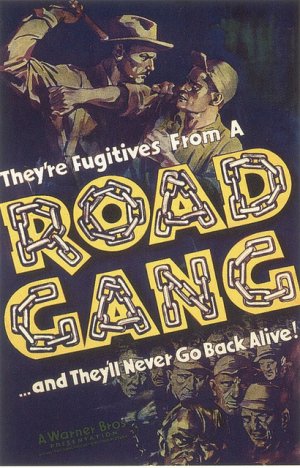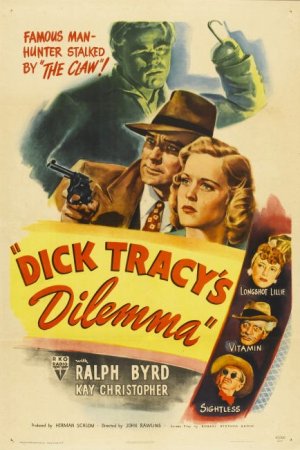I was going to start this review with a quote from Gandhi: “A nation’s greatness is measured by how it treats its prisoners.” That was something that I first heard from a perpetually stoned ex-seminarian who used to live in a trailer park in Lake Dallas. I always figured that, being as stoned as he usually was, he probably knew what he was talking about but, upon doing research for this review, I have discovered that Gandhi actually didn’t say that. What Gandhi said was, “A nation’s greatness is measured by how it treats its weakest members.” Fortunately, it’s the same basic idea and, regardless of how you phrase it, it’s a quote that perfectly encapsulates the message of the 1936 film, Road Gang.
Road Gang tells the story of Jim (Donald Woods) and Bob (Carlyle Moore, Jr.). Bob is fun-loving. Jim is more serious and engaged to marry heiress Barbara Winston (Kay Linaker). Jim and Bob live in an unnamed Southern state (though I’m going to assume that the state is supposed to be Georgia, just because). Jim has just written an article that exposes the corruption of political boss, J.W. Moett (Joe King). The article is so good that both Jim and Bob have been offered jobs in Chicago! There’s a lot of corrupt political figures who can be exposed in Chicago!
However, while driving up north, Jim and Bob are arrested on trumped-up charges. At first, Jim and Bob laugh off Moett’s desperation but, unfortunately, another criminal happens to be breaking out of jail at the same time that Jim and Bob arrives for booking. That criminal kills the arresting officer and then forces Jim and Bob to drive him across the state. Eventually, the police recapture the three of them. However, the escaping criminal is killed and Jim and Bob are arrested as accessories. Under the advice of their lawyer, Mr. Dudley (Edward Van Sloan), they plead guilty and accept a deal. What they don’t know is that Dudley works for Moett and that, as a result of pleading guilty, they are going to be sentenced to five years in a prison camp.
Okay, so the film gets off to a pretty melodramatic start. And, to be honest, the entire film is extremely melodramatic. A lot of time is devoted to Barbara trying find evidence that Jim and Bob were set up, something that is made difficult by the fact that Barbara’s father, like Mr. Dudley, works for Moett. Fast-paced and not-always-logical, this is a B-movie, in every sense of the term.
And yet, as melodramatic as it is, Road Gang is deadly serious when it comes to portraying the brutality of the prison camp. From the minute that Bob and Jim arrive, they find themselves at the mercy of the corrupt warden and his sadistic guards. The prisoners are largely used as slave labor and subjected to punishments that are often arbitrary and extreme.
Road Gang doesn’t flinch when it comes to portraying why prison often not only fails to rehabilitate but also helps to transform minor offenders into hardened criminals. There’s a disturbing scene in which Jim, Bob, and the other prisoners are forced to listen as another prisoner is whipped. The crack of the whip and his howls of agony explode across the soundtrack in a symphony of pain and sadism. Jim and Bob have two very different reactions to being in prison. One survives. One allows himself to be killed rather than take one more day in confinement.
Road Gang is often compared to I Am A Fugitive From A Chain Gang. Actually, beyond the theme of a fatally compromised justice system, there is no comparison. The angry and fact-based I Am A Fugitive From A Chain Gang is a hundred times better and, quite frankly, Donald Woods was no Paul Muni. However, Road Gang still has its moments of power. Decades after it was made, the issues it raises continue to be relevant. Do we send people to prison to rehabilitate them or to punish them and are the two goals mutually exclusive? And how can we say that someone has “paid his debt to society” when, even after a prisoner serves his time, the stigma of having been imprisoned closes and locks most doors of opportunity?
Road Gang shows up occasionally on TCM. There’s where I recorded it on January 23rd of this year.

